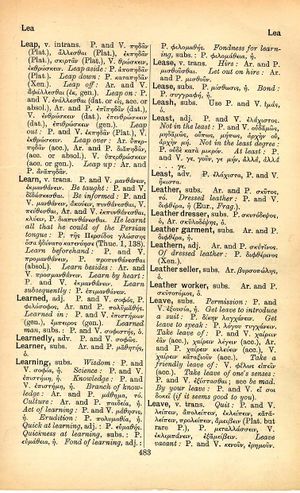leave
Τίμα τὸ γῆρας, οὐ γὰρ ἔρχεται μόνον → Metue senectam: quippe comitata advenit → Das Alter achte, denn alleine kommt es nicht
{{Woodhouse1
|Text=
subs.
Permission: P. and V. ἐξουσία, ἡ. Get leave to introduce a suit: P. δίκην λαγχάνειν. Get leave to speak: P. λόγου τυγχάνειν. Take leave of: P. and V. χαίρειν ἐᾶν (acc.), χαίρειν λέγειν (acc.), Ar. and P. χαίρειν κελεύειν (acc.), V. χαίρειν καταξιοῦν (acc.). Take a friendly leave of: V. φίλως εἰπεῖν (acc.). Take leave of one's senses: P. and V. ἐξίστασθαι; see be mad. By your leave: P. and V. εἴ σοι δοκεῖ (if it seems good to you). v. trans. Quit: P. and V. [[λείπω|λείπειν, ἀπολείπειν, ἐκλείπειν, καταλείπειν, προλείπειν, ἀμείβειν (Plat. but rare P.), P. μεταλλάσσειν, V. ἐκλιμπάνειν, ἐξαμείβειν. Leave vacant: P. and V. κενοῦν, ἐρημοῦν. You have left no hope among us: V. οὐδʼ ἐλλέλοιπας ἐλπίδα (Eur., El. 609). Bequeath: Ar. and P. καταλείπειν, V. [[λείπω|λείπειν (Eur., Alc. 688). Leave alone, let be: P. and V. ἐᾶν. Leave behind: Ar. and B. ὑπολείπειν. Be left behind (in a contest): P. and V. λείπεσθαι, V. ἐλλείπεσθαι, Ar. and P. ὑπολείπεσθαι. Leave for decision: see leave to. Leave go of: P. and V. μεθιέναι (acc.), ἀφιέναι (acc.), ἀφίεσθαι (gen.), Ar. and V. μεθίεσθαι (gen.). Leave in (a place): P. ἐγκαταλείπειν (absol.). Leave in the lurch: P. and V. [[λείπω|λείπειν, καταλείπειν, προλείπειν, προδιδόναι, ἐρημοῦν, Ar. and P. προϊέναι (or mid.). Leave off: v. trans., P. and V. μεθιέναι; v. intrans., see cease. Leave out: P. and V. παραλείπειν (Eur., Hel. 773), παριέναι, ἐκλείπειν, ἐλλείπειν. Be left over: Ar. and V. περιλείπεσθαι; see remain. Leave to (for decision, etc.): Ar. and P. ἐπιτρέπειν (τί τινι), V. παριέναι (τί τινι); see refer. }}

